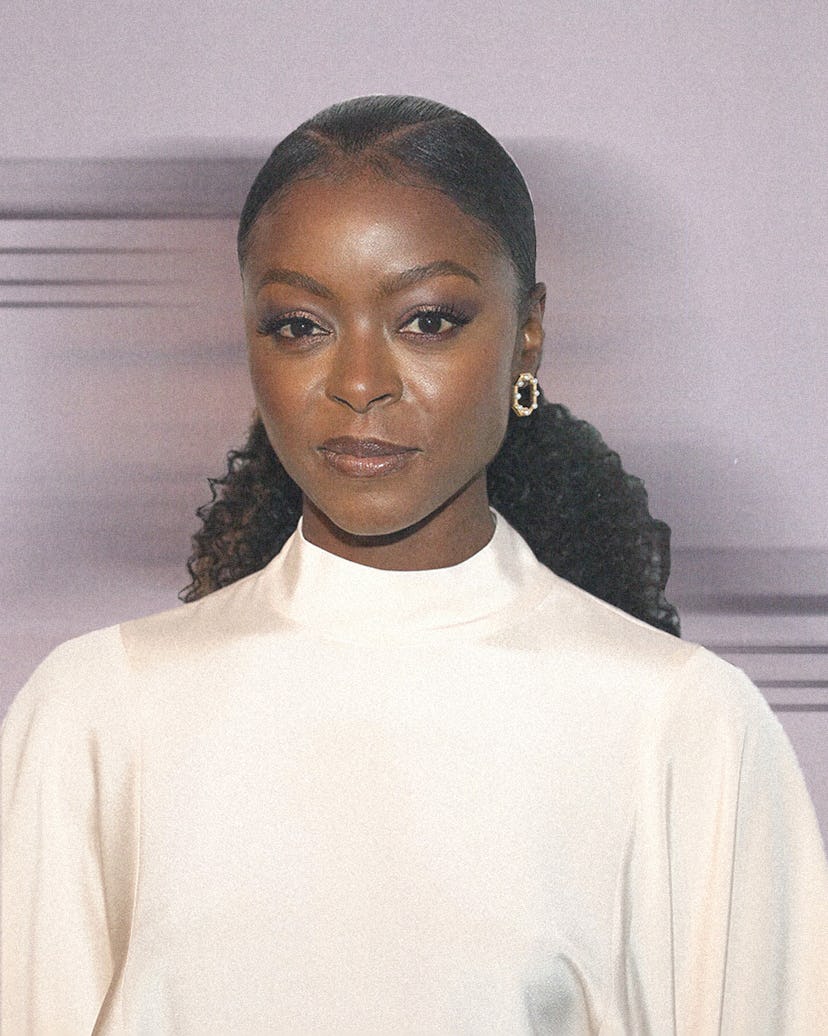Till Puts Danielle Deadwyler’s Mettle Front and Center
The actress, who plays Emmett Till’s mother Mamie in the Chinonye Chukwu film, has emerged as one of the most thrillingly versatile performers in Hollywood.

Before Danielle Deadwyler received widespread acclaim for her role as Mamie Till-Mobley—the civil rights activist and mother of Emmett Till—in Till, she taught fourth and fifth grade students. The actress and artist, who has an MFA in poetry and an MA in American Studies, eventually found her way into the Atlanta theater scene—and now, she might very well be nominated for an Oscar. But she always brings her past as an educator into her absolutely shattering work.
“If you’re choosing me as your actor, as your collaborator, then I want to bring that specific truth to the experience,” she says during a recent phone call. “That’s why I lived so hard in the academic component, in the historical text component, because it’s important to synthesize those things."
Though she’s been working steadily for nearly a decade over the past two years, Deadwyler has emerged as one of the most thrillingly versatile performers in Hollywood. In last year’s Netflix western, The Harder They Fall, she played the focused, gender-nonconforming outlaw, Cuffee—then followed that up with a lauded portrayal of a graphic novelist in the dsytopian HBO Max limited series Station Eleven. Till is both her biggest stage to date, as well as a role that comes with a hefty amount of responsibility—so much so that she was initially hesitant to even audition.
When the script came along, she was in the early stages of working on the Netflix series From Scratch. She had moved to Los Angeles from Atlanta and was trying to find an apartment, attempting to settle into a new city. The prospect of tackling a film centered around one of the most notorious and horrific events of racial violence in America’s history was overwhelming. Emmett Till was tortured and murdered at the age of 14 in Mississippi by a group incited by a white woman, Carolyn Bryant. His killers walked free. “I was like, ‘Oh my God,’” Deadwyler remembers. “‘I can’t do this right now. I’m nervous. I’m fearful.’” She did not read the script co-written by director Chinonye Chukwu all the way through in one sitting; instead, she took breaks as she went through the text.
But there was a connection that she couldn’t ignore. Emmett Till was lynched in 1955, the same year her mother was born. “The year Mamie lost her child is the year my mother was born into this violent world, the violent America of that time,” she says. “I thought about that a lot.” Deadwyler was aware that taking on Mamie would be heavier than other jobs. In a session with Chukwu before she officially was cast, they worked on the sequence where Mamie first takes in Emmett’s abused body, drawing on Mamie’s memoir in the process. “It’s an impossible weight and I knew that’s what it was going to be,” she says. “But it’s a weight that I very much continue to have because I’m a mother of a 13-year-old son, and I have to have those same conversations that Mamie had to have with her son.”
Deadwyler, no stranger to research, immersed herself in the archival materials at her disposal, but also in visual art and poetry concerning the event. “It was this full experience of learning about Mamie and Emmett intimately,” she says. “I let all the ingredients boil together.” It was a challenge she was uniquely equipped to approach given her multidisciplinary skills.
Making Till also reminded Deadwyler of her time in the world of performance art, creating pieces that have been exhibited at Spelman College Museum of Fine Art and Atlanta’s ELEVATE public art program. In performance art, she tells me, the audience has to be part of the work in a way that isn’t always the case when acting—which can be entirely internal. Here, she invited everyone on set into her process. “I couldn’t just hold it all in me,” she says. “Everyone in the cast and crew was in on it in a different kind of way. I was charging them to have the experience with me, as opposed to me just having an experience that they get to witness.” On some of the most difficult days—like when they filmed Mamie’s courtroom testimony, in which Chukwu keeps the camera trained entirely on Deadwyler’s face—the camera department wore button-down shirts and ties in respect, mourning, and solidarity.
Now that the film is being released wide on October 28, the range of people whom Deadwyler is reaching as Mamie is broadening. Following Till’s New York Film Festival premiere, there was a screening at Lincoln Center’s Alice Tully Hall for local students. And while there have been reports predicting an impending Academy Award nomination, that’s not of any concern for Deadwyler. “People can do that. That’s fine,” she says. “The more that it engages Mamie, the more that it engages Emmett, the more that it engages the love and the joy that they share in this film—which is imperative for people to understand; you’re not just going to witness a traumatic story, you’re going to witness a resilient story of joy and legacy—if that’s what it brings people to, then the more the merrier.”